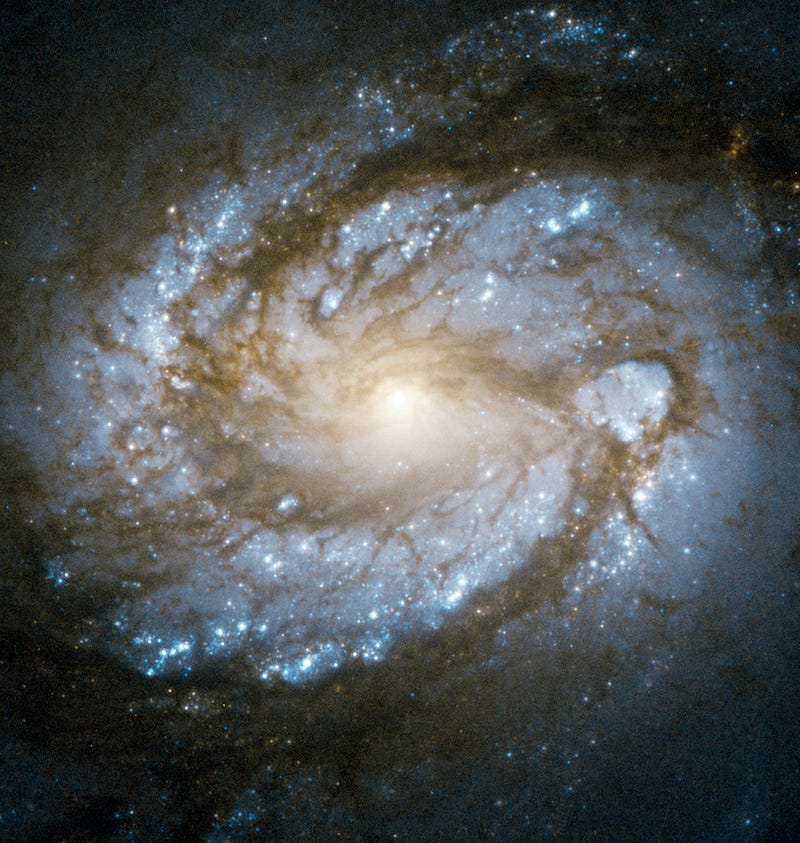10 Things You Didn’t Know About the Anthropic Principle
And what it might — and might not — give us useful insights into.
Image credit: Karen46 of http://www.freeimages.com/profile/karen46.
“The anthropic principle – the idea that our universe has the properties it does because we are here to say so and that if it were any different, we wouldn’t be around commenting on it – infuriates many physicists, including [Marc Davis from UC Berkeley]. It smacks of defeatism, as if we were acknowledging that we could not explain the universe from first principles. It also appears unscientific. For how do you verify the multiverse? Moreover, the anthropic principle is a tautology. “I think this explanation is ridiculous. Anthropic principle… bah,” said Davis. “I’m hoping they are wrong [about the multiverse] and that there is a better explanation.”” -Anil Ananthaswamy, in The Edge of Physics
Starting in the mid-1970s, the anthropic principle has been employed in physics as an explanation for values of (and constraints on) parameters in our best physical theories, but in 2014 I still come across ill-informed statements like the one above in Anil Ananthaswamy’s (otherwise very recommendable) book “The Edge of Physics”. I’m no fan of the anthropic principle because I don’t think it will lead to big insights. But it’s neither useless nor a tautology nor does it acknowledge that the universe can’t be explained from first principles.
Below are ten of the most important and, to some, surprising facts about the anthropic principle, where I am using to the definition from Ananthaswamy’s quote, “Our universe has the properties it does because if it were any different we wouldn’t be here to comment on it.”

1.) The anthropic principle doesn’t necessarily have anything to do with the multiverse.
The anthropic principle is equally valid regardless of whether there is a multiverse or not and regardless of what is the underlying explanation for the values of parameters in our theories, if there is one. The reason it is often brought up by multiverse proponents is that they claim the anthropic principle is the only explanation, and that there can be no other selection principle for the parameters that we observe. One then needs to show though that the value of parameters we observe is indeed the only allowable one (or at least the most probable one) if one requires that life is possible. This is, however, highly controversial; see the next item.
2.) The anthropic principle cannot explain the values of all parameters in our theories.
The typical claim that the anthropic principle explains the value of parameters in the multiverse goes like this: if parameter x was just a little larger or a little smaller, we wouldn’t exist, and therefore only this particular value of parameter x is allowed by the anthropic principle. The problem with this argument is that small variations in one out of two dozen parameters are not the full suite of possible combinations. You’d really have to consider independent modifications of all parameters to be able to conclude there is only one combination supportive of life. This, however, is not a presently feasible calculation.
Though we cannot presently scan the whole parameter space to find out which combinations might be supportive for life, we can do a little better than one and try at least a few. This has been done, and thus we know that the claim that there is really only one combination of parameters that will create a universe hospitable to life is on very shaky ground.
In their 2006 paper “A Universe Without Weak Interactions”, published in Phys. Rev. D, Harnik, Kribs, and Perez put forward a universe that seems capable of creating life and yet is entirely different from our own, with one of the four fundamental forces completely omitted. Don Page argues that the universe would be more hospitable for life if the cosmological constant was smaller than the observed value, and recently it was claimed that life might have been possible very early on in the universe’s history. All these arguments show that a chemistry complex enough to support life can arise under circumstances that, while still special, are not anything like the ones we experience today.

3.) Even so, the anthropic principle might still explain some parameters.
The anthropic principle might, however, still work for some parameters if their effect is almost independent on what the other parameters do. That is, even if one cannot use the anthropic principle to explain all values of parameters because one knows there are other combinations allowing for the preconditions of life, some of these parameters might need to have the same value in all cases. The cosmological constant is often claimed to be of this type, with the particular constraint that if it were larger in magnitude (of either positive or negative sign), the formation of even primitive life would be exceedingly unlikely.
4.) The anthropic principle may be trivial, but that doesn’t mean it’s obvious.
Mathematical theorems, lemmas, and corollaries are results of derivations following from assumptions and definitions. They essentially are the assumptions, just expressed differently. They are always true and sometimes trivial. But often, they are surprising and far from obvious, though that is inevitably a subjective statement. Complaining that something is trivial is like saying, “It’s just sound waves,” while referring to everything from engine noise to Mozart.
5.) The anthropic principle isn’t useless.
While the anthropic principle might strike you as somewhat silly and trivially true, it can be useful for example to rule out values of certain parameters. The most prominent example is probably the cosmological constant which, if it was too large, wouldn’t allow the formation of structures large enough to support life. This is not an empty conclusion. It’s like when I see you drive to work by car every morning and conclude you must be old enough to have a driver’s license. (You might just be stubbornly disobeying laws, but the universe can’t do that.) The anthropic principle is in its core function a consistency constraint on the parameters in our theories. One could derive from it predictions on the possible combinations of parameters, but since we have already measured them these are now merely post-dictions.
Fred Hoyle’s prediction of properties of the carbon nucleus that make possible the synthesis of carbon in stellar interiors — properties that were later discovered as predicted — is often quoted as successful application of the anthropic principle because Hoyle is said to have exploited the fact that carbon is central to life on Earth. Some historians have questioned whether this was indeed Hoyle’s reasoning, but the mere fact that it could have been shows that anthropic reasoning can be a useful extrapolation of observation — in this case the abundance of carbon on our planet.

6.) The anthropic principle does not imply a causal relation.
Though the use of the word “because” suggests it, there is no causation in the anthropic principle. An everyday example for “because” not implying an actual cause: I know you’re sick because you’ve got a cough and a runny nose. This doesn’t mean the runny nose caused you to be sick. Instead, it was probably some virus. Alas, you can carry a virus without showing symptoms, so it’s not like the virus is the actual “cause” of my knowing. Likewise, that there is somebody here to observe the universe did not cause a life-friendly universe to spring into existence. (And the converse, that a life-friendly universe caused our existence, isn’t correct because it’s not like the life-friendly universe sat somewhere out there and then decided to come into existence to produce some humans.)
7.) The applications of the anthropic principle in physics have actually nothing to do with life.
As Lee Smolin likes to point out, the mentioning of “life” in the anthropic principle is entirely superfluous verbal baggage (my words, not his). Physicists don’t usually have a lot of business with the science of self-aware conscious beings. They talk about formation of large scale structures or atoms that are preconditions for biochemistry, but you shouldn’t even expect physicists to discuss large molecules. Talking about “life” is arguably catchier, but that’s really all there is to it. If you can give us a universe full of galaxies, stars, a variety of atoms and the ability for them to bind together in interesting ways, physicists are generally happy enough to consider that equivalent to having generated the conditions for life.
8.) The anthropic principle is not a tautology in the rhetorical sense.
It does not use different words to say the same thing: A universe might be hospitable to life and yet life might not feel like coming to the party, or none of that life might ever ask a why-question. In other words, getting the parameters right is a necessary but not a sufficient condition for the evolution of intelligent life. The rhetorically tautological version would be, “Since you are here asking why the universe is hospitable to life, life must have evolved in that universe that now asks why the universe is hospitable to life.” Which you can easily identify as rhetorical tautology because now it sounds entirely stupid.

9.) It’s not a new or unique application.
Anthropic-type arguments, based on the observation that there exists somebody in this universe capable of making an observation, are not only used to explain free parameters in our theories. They sometimes appear as “physical” requirements. For example: we assume there are no negative energies because otherwise the vacuum would be unstable and we wouldn’t be here to worry about it. And requirements like locality, separation of scales, and well-defined initial value problems are essentially based on the observation that otherwise we wouldn’t be able to do any science, if there was anybody to do anything at all. Logically, these requirements are the same as anthropic arguments, they just aren’t referred to it as such.
10.) Other variants of the anthropic principle have questionable scientific value.
The anthropic principle becomes speculative, for not to say unscientific, once you try to go beyond the definition that I referred to here. If one does not understand that a consistency constraint does not imply a causal relation then you come to the strange conclusion that humans caused the universe to exist. And if one does not accept that the anthropic principle is just a requirement that a viable set of theories has to fulfill, one is then stuck with the question of why the parameter values are what they are. Here is where the multiverse comes back, for you can then argue that we are forced to believe in the “existence” of universes with all possible combinations. Or you can go off the deep end and argue that our universe was designed for the existence of life.
Personally I feel the urge to wash my hands after having been in touch with these kinds of arguments. I prefer my principles trivially true.
This post was written by Sabine Hossenfelder, assistant professor of physics at Nordita. You can follow her tweets at @skdh. And if you have comments to share, leave them at the Starts With A Bang forum over on Scienceblogs!





